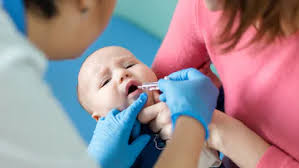
Second Round of Emergency Polio Vaccination Campaign to Begin in Gaza Amid Conflict
The Palestinian Ministry of Health, in collaboration with the World Health Organization (WHO), the United Nations Children’s Fund (UNICEF), and other partners, is set to launch the second round of an emergency polio vaccination campaign in Gaza, scheduled to commence on 14 October 2024. This effort aims to vaccinate 591,700 children under the age of 10 with a second dose of the novel oral polio vaccine type 2 (nOPV2) to halt the ongoing outbreak in the region.
The first round, which took place from 1-12 September 2024, successfully reached 559,161 children, covering 95% of eligible children at the governorate level. Post-campaign monitoring, conducted independently, confirmed the high success rate despite the logistical challenges posed by ongoing conflict and population displacement.
To interrupt poliovirus transmission effectively, at least two doses of the nOPV2 vaccine are required. The second dose will ensure that the campaign reaches its goal of vaccinating at least 90% of children across all communities, a crucial threshold to halt the spread of the virus. Along with the polio vaccine, vitamin A supplements will be co-administered to children between the ages of two and nine, bolstering their overall immunity.
The campaign is part of an emergency response to the polio outbreak, first detected on 16 July 2024, which threatens to spread further if immediate action is not taken. To overcome obstacles like devastated infrastructure and constant population movements, the vaccination drive will be carried out through meticulously planned phases, each consisting of three campaign days followed by a catch-up day. This strategy allows for flexibility in reaching all children, especially those who were missed during the first round.
Mobile vaccination teams will play a critical role in reaching families living in shelters, tents, and camps for internally displaced persons. Teams will also be deployed to areas requiring special coordination, ensuring that even children in hard-to-reach locations receive their vaccines. Despite the overwhelming logistical hurdles, the first round demonstrated that a resilient healthcare workforce, backed by strong community demand, can deliver vital vaccines — provided that humanitarian pauses are respected.
More than 800 social mobilizers will actively engage with families to raise awareness about the importance of receiving the second dose of the polio vaccine. These mobilizers, along with digital channels, radio broadcasts, and SMS alerts, will continue promoting vaccination until the round concludes, helping to ensure broad public participation.
Logistical support for the second round has been streamlined, with provisions for health worker training, the distribution of vaccine supplies, and detailed tracking of vaccination coverage by independent monitors. To facilitate the campaign, 1.6 million doses of the vaccine have been delivered to Gaza over the past two months, along with essential cold chain equipment, including 20 refrigerators, 10 freezers, 100 ice boxes, and 800 vaccine carriers. These resources are critical for maintaining the vaccines at the required temperature of 2 to 8°C.
However, the campaign faces significant constraints, particularly in reaching children living outside of humanitarian pause areas — those who were not covered during the first round. Coordination and approvals are required to ensure that these vulnerable children receive the life-saving vaccine. This coordination is vital for successful campaign supervision and monitoring, helping to ensure that no child, regardless of their location, is left unvaccinated.
Both WHO and UNICEF have reiterated their urgent call for all parties to the conflict to implement humanitarian pauses, allowing health workers to operate in a secure environment. The call comes at a critical time, as new evacuation orders in northern Gaza are threatening access to hospitals and the safety of health workers. Ensuring the protection of vaccination teams, healthcare facilities, and children is paramount to the success of the campaign.
The second round of vaccinations in Gaza represents a crucial step in curbing the polio outbreak and safeguarding the health of hundreds of thousands of children. With robust planning, dedicated healthcare workers, and coordinated international support, the campaign aims to prevent further spread of the virus and protect the future of Gaza's youngest generation.